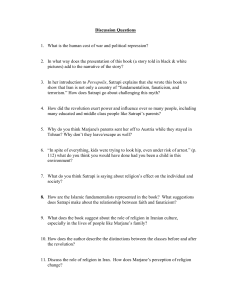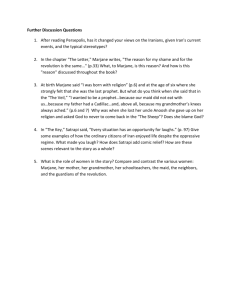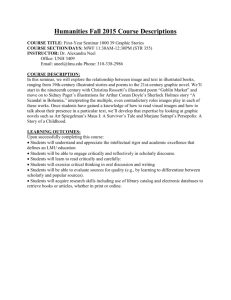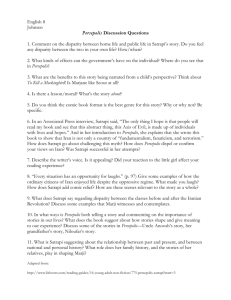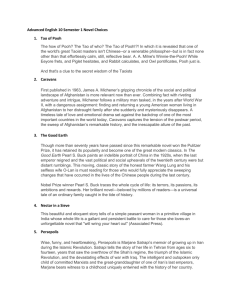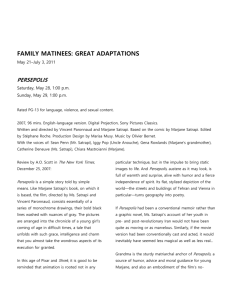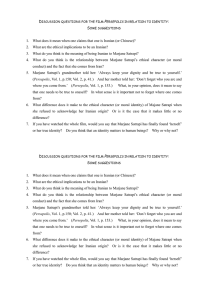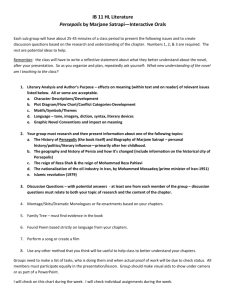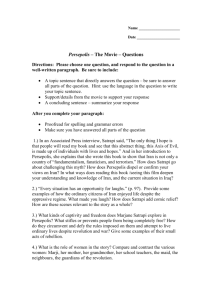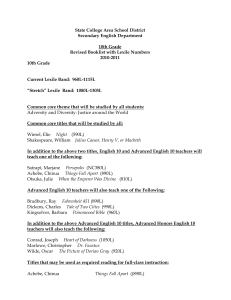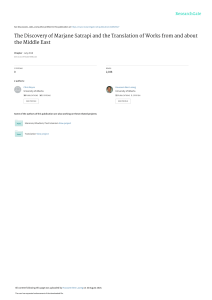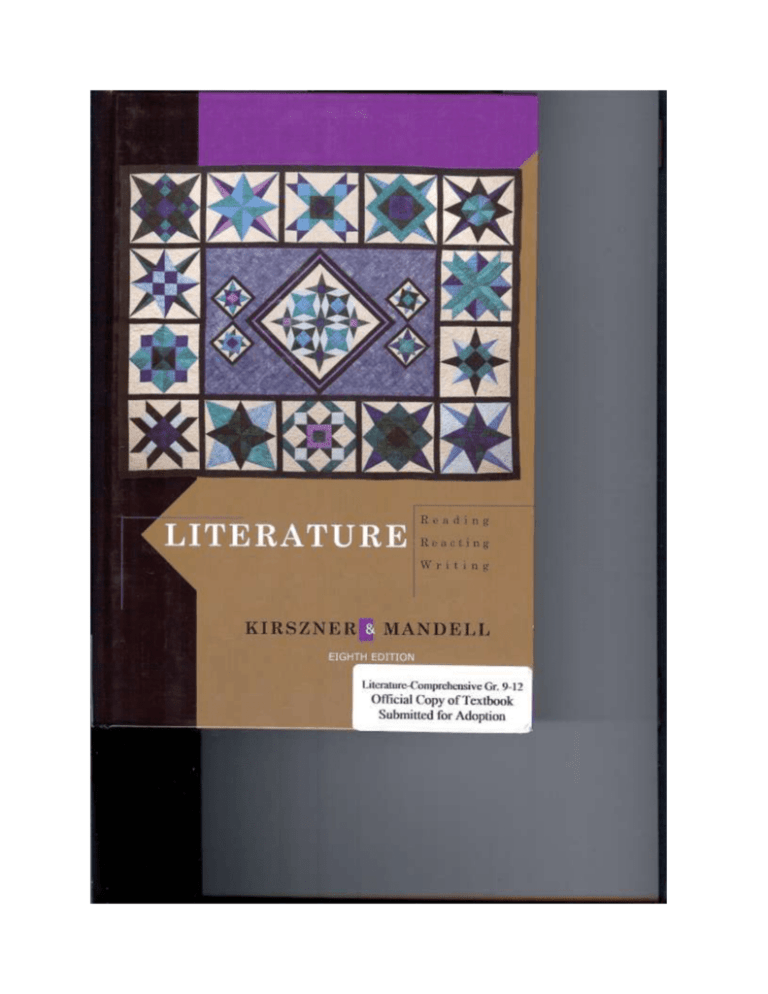
Textbook Adoption 2012 ELA Publishers and Content
Composition: Presented by Holt McDougal
Literature Reading, Reacting, Writing: 8th Edition, Kirszner and Mandell
ISBN - 13: 978-1-111-34480-1
ISBN -10: 1 - 111-34480-9
Wadsworth: Cengage Learning
6: last paragraph: ...Students of American literature were not encouraged to consider the
perspectives of women, of gay and lesbian writers........These additional works.....have opened
up the curriculum and redefined the standards by which literature is judged.
7: " All About Suicide" by Luisa Valenzuela: translated by Helen Lane
9: Interpreting Literature: When you interpret a literary work, you explore its possible
meanings.....its meaning lies buried somewhere within it, waiting to be unearthed.....discover
the author's intent.......hidden between the lines........more recently, however, a different
model of the reading process.....has emerged.
paragraph 2: ..........see the reading process as interactive. ....meaning comes alive in the
imagination of the reader
paragraph 3: The most obvious thing a work supplies is facts
paragraph 4: In addition to facts, a work also conveys the social, political, class, and
gender attitudes of the writer.
11: Note at bottom of page: Keep in mind that some interpretations are not reasonable. You
may contribute ideas based on your own perspectives, but you cannot ignore or contradict
evidence in the text to suit your own biases. As you read and reread a text, continue to
question and reexamine your judgments.
152 Sleep-over by Bonnie Jo Campbell; four teenagers making out,
153: "Ed kissed my mouth, throat, collarbone; he pressed his pelvis into mine."
153: "Pammy whispered that she'd let Ed's brother go into her pants."
159: Walking Upside Down by John Ravenscroft: extremely sexually suggestive
para. 3: ...two flawless legs rise into the air...suddenly straightened, oh-socarefully parted....supple wrists.
para 4:..and at the dark forbidden fork.....a place my eyes have no legitimate
business...
181: except from Persepolis by Marjane Satrapi is one of her major works. Muslim girl
is called a whore.
166: from Maus by Art Spiegelman: graphic novel (comic strip) portrays Jews as rats by giving
the Jewish characters rat-like faces. The Nazis have human faces.
186: Two Questions : graphic novel by Lynda Barry "Is this good: Does this suck?"
191: "Give us this useless piece of *@#%*"
193: "I TOLDJA! YOU'LL GET IT BACK WHEN YOU CAN TELL ME WHAT
THE *@#& IT IS, AND GIVE
ME ONE GOOD REASON....."
194: " What the #%@* was it??"....because like the pimp said, I don't steal
nothing from the girl except her
mind!"
195: in the bottom right corner stacked like books with authors' names: Lao Tsu,
S Freud, Zen Buddhism, D.W. Winnicott, ....
This graphic novel is full of dark imagery connotating, vulgarity (191, 193, 194),
confusion (title and content), sexual and personal identity (189) .
270 - 275: The Girl with Bangs by Zadie Smith ( lesbian affair)
271: "I'd never dated a girl before"
271: " looks like she's thinking about sex all the time"
272: para. 3: "So this is what it's like being a boy...........There is nothing you
won't do."
272: (speaking to the reader) "So: have you? Have you ever been out with a girl
like this?"
275: Reading and Reacting
1. At what point did you realize the narrator was female? Do you think her
feelings and behavior would
have been any different if she were male?
2. What exactly is it about Charlotte that fascinates the narrator? Do you share
this fascination?
9. Journal Entry: Write a farewell email to the narrator from Charlotte.
300: The Storm by Kate Chopin: (adultry, grapic sexual content: see 301 and 302)
Reading and Reacting: Journal Entry: "The storm sets in motion the chain of
events that leads to the
characters' adultery."
322: Battle Royal by Ralph Ellison (naked woman described in detail in a seductive
dance)
542-546: Bullet in the Brain by Tobias Wolff (graphic R rated language) (damned, ass,
suck my dick, fuck with me)
(details of a bank robbery and a man's last thoughts after been shot in the head
by the bank robbers)
551- 563: Where Are You Going, Where Have You Been for Bob Dylan by Joyce Carol
Oates (rape and abduction)
Reading and Reacting:
#4 "Feminist critics might see this story as a familiar tale of a man who uses
flattering seductive language followed by threats of physical violence to
coerce a young woman into giving in to him."
#5. "Dark undertones aside, in what sense is this simply a story about the coming
of age of a typical 1960's teenager?"
#12. Critical Perspective: According to the New York Times..........the author has
a fascination with the dark undercurrents of violence, eroticism and emotional
chaos in American life..............
567-572: The Pied Piper of Tucson by Don Moser (writing on the murders of teenage
girls in Tuscon, AR)
576 - 590: Critical Perspectives of Joyce Carol Oates writings (goes on and on about
this author)
621 - 628: Greasy Lake by T. Coraghessan Boyle (rape, rebellion, drug use, vulgarity)
925: Nude Interrogation by Yusef Komunyakaa (woman strips naked)
954: Leda and the Swan by William Butler Yeats: (poem: strong sexual imagery)
Students are encouraged to listen to this poem online accessed through
www.cengagebrain.com
955: naked woman graphic
955: Journal Entry: Does the poem answer the question asked in its last two
lines? Explain.
1627 - 1631: Alone at Last! by Gina Barnett (very graphic portrayal of two teenagers
having their first sexual experience)
1763 - 1794: Doubt: A Parable by John Patrick Shanley (play about a priest allegedly
molesting a boy)
1794 - 1801: Trying to Find Chinatown by David Henry Hwang (vulgarity: see insert)
AUTHORS (research by the reviewer on line)
Julia Alvarez' authored Snow pg 151
Julia Alvarez' work was used by the Young Communist League for recommended reading. In the
Time of the Butterflies is listed here, but not used in the student edition.
http://www.yclusa.org/article/view/1647/1/299 (See Fiction #2. In the Time of the Butterflies
Julia Alvarez)
Marjane Satrapi, author of Persepolis pg 181 in the student edition
http://globalwire.blogspot.com/2012/05/marjane-satrapi-life-after.html
"Marjane Satrapi is one of the most inspiring storytellers of our time. She is the
embodiment of an artist who uses creativity to express her political views. Satrapi is
best known as the French-Iranian graphic novelist whose best-selling books, Persepolis
and Persepolis 2, were turned into a film of the same name.
“There is no clash between East and West, North and South, and Muslim and
Christian. There is a clash between fanatics and open-minded people, and fanatics
are everywhere,” she said. “I see no difference between a hardcore Christian who
kills a doctor because he made an abortion, or a crazy Muslim who burns something,
or a crazy Buddhist who does another thing. Fanatics are driven by emotion.”
Marjane Satrapi
Zadie Smith The Girl with Bangs pg 270
"All I can do is continue to work very hard on my little projects, taking in any influence I feel like, and not
fearing subjects that interest me. 19th century Jamaica interests me. The 70’s Black Power movement in
London interests me. The feminist lesbian movements of the 60’s and 70’s interest me. At the moment,
sci fi, speculative fiction, interests me enormously. I’m so excited now about the next decade. I feel
free!" http://literateur.com/interview-with-zadie-smith/
Her tenure as Writer in Residence at the Institute of Contemporary Arts resulted in the publication of an anthology of
erotic stories entitled Piece of Flesh (2001). http://www.literati.net/authors/zadie-smith/
“If religion is the opiate of the people, tradition is an even more sinister analgesic, simply because it
rarely appears sinister. If religion is a tight band, a throbbing vein, and a needle, tradition is a far
homelier concoction: poppy seeds ground into tea; a sweet cocoa drink laced with cocaine; the kind of
thing your grandmother might have made.”
― Zadie Smith, White Teeth
http://www.goodreads.com/author/quotes/2522.Zadie_Smith

